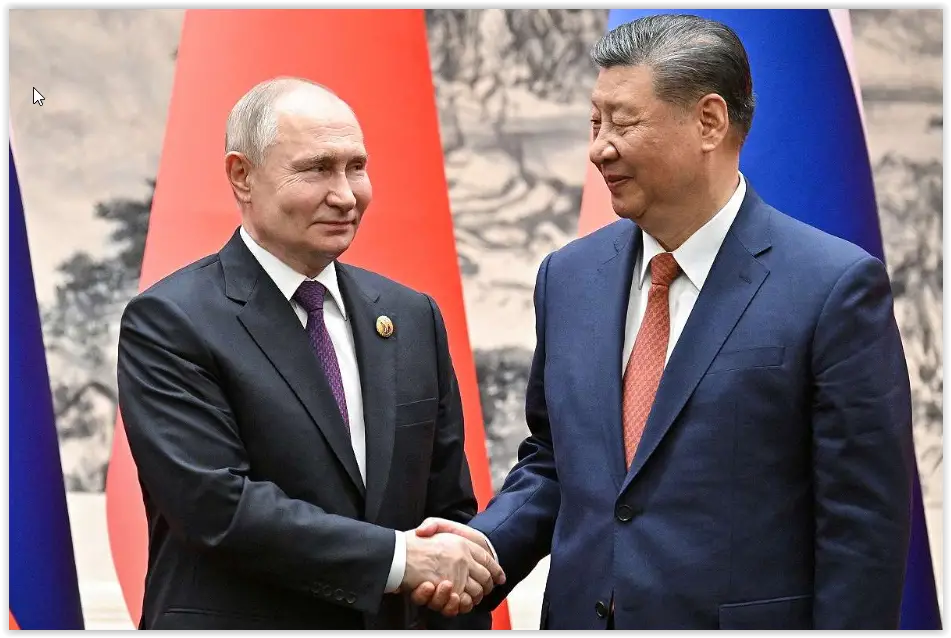On a crisp Thursday, 15 May 2024, in Beijing, under the expansive ceilings of the Great Hall of the People, a significant geopolitical event unfolded. Chinese leader Xi Jinping and Russian President Vladimir Putin, amidst the regalia of military pageantry, not only reaffirmed but deepened their countries’ strategic partnership. This meeting, marking Putin’s first state visit since his re-election, was more than ceremonial; it was a declaration of increasingly aligned interests against a backdrop of global instability.
A Strategic Alignment in Uncertain Times
As Moscow continues its military activities in Ukraine, this summit in Beijing has highlighted a stark pivot towards a Sino-Russian bloc that stands in ever-starker contrast to Western geopolitical strategies. The extensive joint statement released post-discussions underscored a mutual understanding and shared stance on several pressing international issues, from the situation in Ukraine to the tensions across the Taiwan Strait and the conflicts in the Middle East.
The timing of Putin’s visit is symbolic and strategic, coming off the heels of his inauguration for a new term. It signals a tightening of relations as both nations find common ground in their friction with the West. The leaders described their bilateral relations as experiencing “the best period in their history,” a stark acknowledgment of their growing reliance and support for one another amidst global scrutiny and sanctions.

Economic Bonds and Military Cooperation
During the meetings, which saw attendance from top defense and security officials from Russia, there was significant discourse on enhancing not just diplomatic ties but also economic, industrial, and agricultural collaborations. This includes a pronounced boost in bilateral trade, which reached record levels the previous year, demonstrating an intertwined economic dependency particularly pivotal for Russia as it faces ongoing Western sanctions.
Moreover, both leaders committed to “deepen trust and cooperation in the military field,” planning to expand the scope of joint military exercises, conduct regular joint sea and air patrols, and enhance their joint response capabilities to perceived threats and challenges.
Addressing International Concerns
The summit occurs amid mounting international apprehensions about the trajectory of the Ukrainian conflict and the unyielding posture of Russia’s economy and military operations, reportedly undeterred by Western sanctions. Interestingly, US officials have pointed fingers at Beijing, suggesting a clandestine support network bolstering Russia’s defense sectors, a claim China robustly denies.
Putin’s itinerary included informal discussions about the war in Ukraine, with significant Russian defense personnel in attendance, indicating the gravity of the discourse expected to unfold. Meanwhile, the global stage watches anxiously as Ukraine’s President Volodymyr Zelensky pauses his international engagements to focus on a surprise Russian offensive.
A Unified Stance Against Western Policies
In a powerful joint press appearance, Xi Jinping called for a balanced approach to peace talks concerning Ukraine, emphasizing the need for understanding and accommodating the interests of all parties involved. He voiced a strong desire for peace and stability in Europe, positioning China as a mediator while continuing to uphold a stance of neutrality in the conflict.
Both leaders criticized what they perceive as a lingering “Cold War mentality” from Western powers, with Xi specifically denouncing “unilateral hegemony and power politics” as threats to global peace and security. This rhetoric not only reinforces their shared perspectives towards the US and its allies but also underscores an emerging axis in global politics that seeks to challenge the established world order dominated by the West.
Looking Ahead
As the summit concluded, the focus extended beyond the confines of Beijing’s grand political halls. Putin’s next stops include trade and cooperation forums in Harbin, a region of historical tensions but growing connectivity with Russia’s Far East. His visit to the Harbin Institute of Technology, recently sanctioned by the US, symbolizes a defiant stride towards deeper educational and technological cooperation between China and Russia.
This Beijing summit has unequivocally set the stage for a new era in Sino-Russian relations, one characterized by strategic cooperation, economic interdependency, and a unified front against Western pressures. As the world watches, the unfolding narrative of this partnership will undoubtedly shape the contours of global diplomacy and international relations in the years to come.